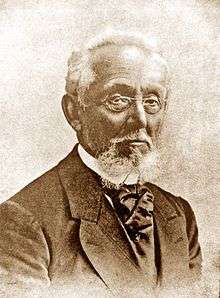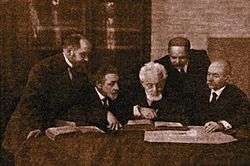Mendele Mocher Sforim

Mendele Mocher Sforim (Yiddish: מענדעלע מוכר ספֿרים, Hebrew: מנדלי מוכר ספרים, also known as Moykher, Sfarim; lit. "Mendele the book peddler"; January 2, 1836, Kapyl – December 8, 1917 [N.S.], Odessa), born Sholem Yankev Abramovich (Yiddish: שלום יעקבֿ אַבראַמאָװיטש, Russian: Соломон Моисеевич Абрамович – Solomon Moiseyevich Abramovich) or S. J. Abramowitch, was a Jewish author and one of the founders of modern Yiddish and Hebrew literature.
Youth
Mendele was born to a poor family in Kapyl in Minsk Governorate. His father, Chaim Moyshe Broyde, died shortly after Mendele became Bar Mitzvah. He studied in yeshiva in Slutsk and Vilna until he was 17; during this time he was a day-boarder under the system of Teg-Essen, barely scraping by, and often hungry.
Mendele next traveled extensively around Belarus, Ukraine and Lithuania at the mercy of an abusive beggar named Avreml Khromoy (Russian for "Avreml the Lame"; Avreml would later become the source for the title character of Fishke der Krumer, Fishke the Lame). In 1854, Mendele settled in Kamianets-Podilskyi, where he got to know writer and poet Avrom Ber Gotlober, who helped him to understand secular culture, philosophy, literature, history, Russian and other languages.
Early work
Mendele's first article, "Letter on Education", appeared in 1857 in the first Hebrew newspaper, Hamagid; his mentor Gotlober submitted Mendele's school paper without Mendele's prior knowledge. At Berdychiv in the Ukraine, where he lived from 1858 to 1869, he began to publish fiction both in Hebrew and Yiddish. Having offended the local powers with his satire, he left Berdichev to train as a rabbi at the relatively theologically liberal, government-sponsored rabbinical school in Zhytomyr, where he lived from 1869 to 1881, and became the head of the traditional school (Talmud Torah) in Odessa in 1881. He lived in Odessa until his death in 1917, except for two years in Geneva, where he fled the government-inspired pogroms following the failed revolution of 1905.[1]
Grandfather of Yiddish literature
Mendele initially wrote in Hebrew, coining many words in that language, but ultimately switched to Yiddish in order to expand his audience. As did Sholem Aleichem, he used a pseudonym because of the perception at the time that as a ghetto vernacular, Yiddish was not suited to serious literary work — an idea he did much to dispel. His writing strongly bore the mark of the Haskalah. He is considered by many to be the "grandfather of Yiddish literature," a name applied by Aleichem in the dedication to his novel Stempenyu;[2] his style in both Hebrew and Yiddish has strongly influenced several generations of later writers.
While the tradition of journalism in Yiddish had a bit more of a history than in Hebrew, Kol Mevasser, which he supported from the outset and where he published his first Yiddish story "Dos Kleine Menshele" ("The Little Man") in 1863, is generally seen as the first stable and important Yiddish newspaper.[3]
Ideology and later work

Sol Liptzin writes that in his early Yiddish narratives, Mendele "wanted to be useful to his people rather than gain literary laurels". [Liptzin, 1972, 42] "The Little Man" דאס קליינע מענטשעלע and the unstaged 1869 drama Di Takse ("The Tax") both condemned the corruption by which religious taxes (in the latter case, specifically the tax on kosher meat) were diverted to benefit community leaders rather than the poor. This satiric tendency continued in Die Klatshe (The nag, 1873) about a prince, a stand-in for the Jewish people, who is bewitched and becomes a much put-upon beast of burden, but maintains his moral superiority throughout his sufferings (a theme evidently influenced by Apuleius' classical picaresque novel The Golden Ass).
His later work became more humane and less satiric, starting with Fishke der Krimmer פישקע דער קרימער (written 1868-1888) - which was adopted in to a film under the same name in 1939 (the English title is The Light Ahead) - and continuing with the unfinished Masoes Beniamin Hashlishi (מסעות בנימין השלישי) (The Travels of Benjamin III, 1878), something of a Jewish Don Quixote. (The title is a reference to the well-known travel book of the Medieval Spanish-Jewish traveller Benjamin of Tudela.) This was adapted for the Jüdischer Kulturbund as a play in 1938 by Hermann Sinsheimer and performed there shortly after the Reichspogromnacht.
As with Fishke, Mendele worked on and off for decades on his long novel Dos Vinshfingeril (The Wishing Ring, 1865–1889); at least two versions preceded the final one. It is the story of a maskil—that is, a supporter of the Haskalah, like Mendele himself—who escapes a poor town, survives misery to obtain a secular education much like Mendele's own, but is driven by the pogroms of the 1880s from his dreams of universal brotherhood to one of Jewish nationalism. The first English translation, by Michael Wex (author of Born to Kvetch) was published in 2003.
References
- ↑ Zuckerman, Stillman, Herbst, "Selected Works of Mendele Moykher-Sforim," Vol. One of "The Three Great Classic Writers of Modern Yiddish Literature, 1991, Joseph Simon, Pangloss Press.
- ↑ Seidman, Naomi (1997). A marriage made in heaven: the sexual politics of Hebrew and Yiddish. University of California Press. p. 146.
- ↑ Liptzin, Sol (1963). The Flowering of Yiddish Literature. New York: Thomas Yoseloff. p. 23.
Further reading
- Liptzin, Sol, A History of Yiddish Literature, Jonathan David Publishers, Middle Village, NY, 1972, ISBN 0-8246-0124-6, especially 40-45.
- YIVO Encyclopedia of Jews of Eastern Europe
- Mendele Moykher-Sforim, La Haridelle, 2008, Paris, Bibliothèque Medem ; novel translated in French by Batia Baum, introduction by Rachel Ertel.
External links
| Wikimedia Commons has media related to Mendele Mocher Sforim. |
- Works by or about Mendele Mocher Sforim at Internet Archive
- Works by Mendele Mocher Sforim at LibriVox (public domain audiobooks)

- Mendele, a mainly English-language newsletter about Yiddish language and culture, is named after Mendele Mocher Sforim.
- Mendele Moykher-Sforim at Maison de la culture Yiddish-Bibliothèque Medem.
- Literature by and about Mendele Mocher Sforim in University Library JCS Frankfurt am Main: Digital Collections Judaica